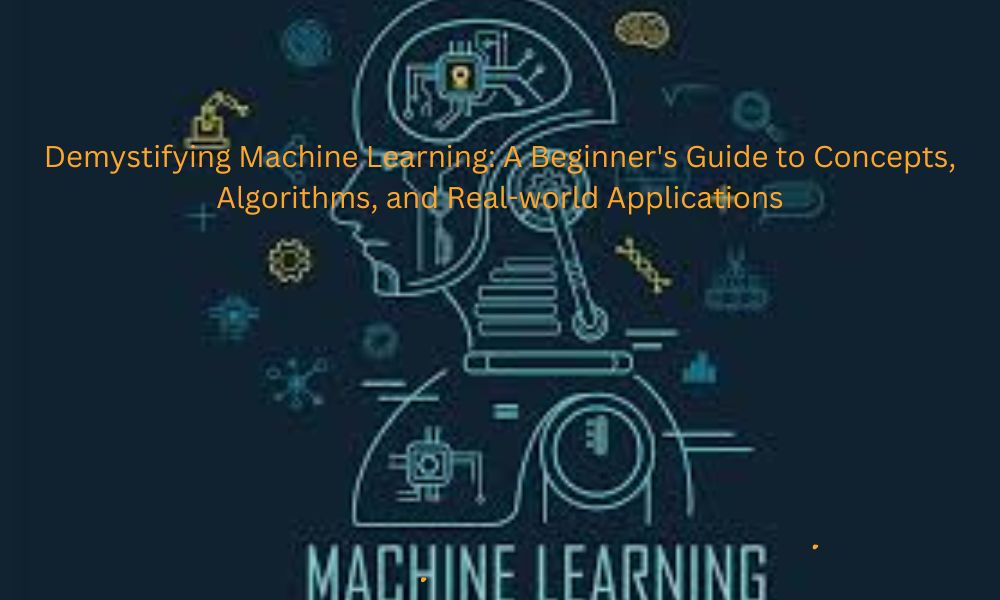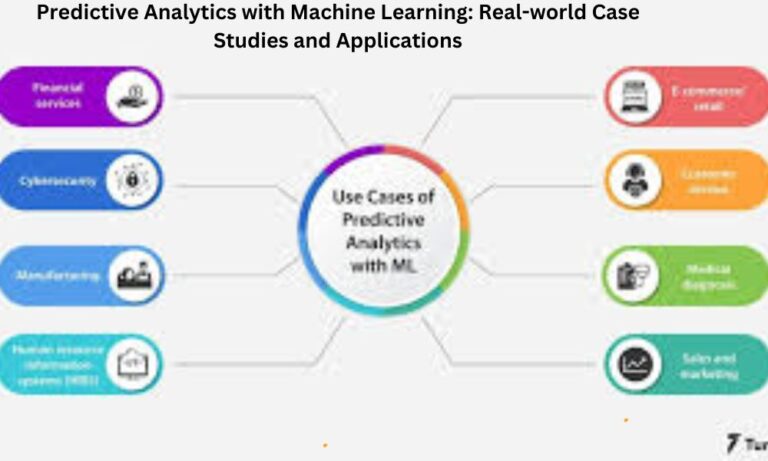Demystifying Machine Learning: A Beginner’s Guide to Concepts, Algorithms, and Real-world Applications
Embark on a beginner-friendly journey through the world of machine learning. Here we will be understanding the fundamental concepts, explore various algorithms, and discover practical applications through real-world examples.
Table of Contents
Setting the Stage for Machine Learning Exploration
The field of machine learning has evolved significantly, becoming an integral part of various industries. In this beginner’s guide, we will unravel the complexities of machine learning, providing insights into fundamental concepts, diverse algorithms, and real-world applications.
The Growing Relevance of Machine Learning in Today’s World
Machine learning’s increasing influence is evident in our daily lives, from recommendation systems on streaming platforms to voice assistants on our smartphones. As we delve into this guide, we’ll explore why understanding machine learning is crucial in the contemporary landscape.
Overview of What to Expect in the Beginner’s Guide
This guide will progress through key areas, starting with foundational concepts and moving on to practical applications. Let’s begin our journey into the fascinating world of machine learning.
Understanding Machine Learning Basics
Defining Machine Learning and its Evolution
Machine learning is a subset of artificial intelligence (AI) that enables systems to learn and improve from experience. Initially, rule-based systems dominated, but machine learning introduced the ability to adapt and learn autonomously.
Core Concepts for Beginners
Supervised Learning
Supervised learning involves training a model using labeled data, where the algorithm learns to map input to output. This section will elucidate the significance of supervised learning in various applications.
Unsupervised Learning
Contrary to supervised learning, unsupervised learning deals with unlabeled data. We’ll explore how algorithms discern patterns and relationships within data without explicit guidance.
Reinforcement Learning
Reinforcement learning involves training a model to make sequences of decisions. We’ll demystify how this learning paradigm is employed in scenarios like gaming and robotics.
Importance of Data in Machine Learning
Data forms the backbone of machine learning. Understanding its role is pivotal for beginners. We’ll discuss the types of data, data preprocessing, and the impact of quality data on model performance.
Dive into ML Algorithms
Linear Regression
Linear regression is a fundamental algorithm for predicting numeric values. Let’s explore its workings, use cases, and how it lays the groundwork for more complex models.
Decision Trees
Decision trees are versatile and explainable models. Delve into the mechanics of decision trees and discover real-world examples showcasing their effectiveness.
Unsupervised Learning Algorithms
K-Means Clustering
K-Means Clustering is a popular unsupervised algorithm for grouping data. We’ll delve into the concept of cluster analysis and its applications.
Principal Component Analysis (PCA)
Understanding dimensionality reduction is essential. PCA simplifies complex data, making it comprehensible. Real-world applications will illuminate its significance.
Practical Machine Learning: Real-world Applications
Image Recognition
The Role of ML in Image Recognition
Image recognition is pervasive in our lives, from facial recognition on social media to medical image analysis. We’ll explore the underlying technology and its applications.
Notable Applications and Success Stories
Real-world success stories in image recognition, such as self-driving cars and security systems, will be highlighted. These examples will showcase the transformative power of machine learning.
Natural Language Processing (NLP)
Introduction to NLP and Its Significance
NLP enables machines to understand, interpret, and generate human language. In this section, we’ll introduce NLP and discuss its significance in applications like chatbots and language translation.
Applications in Everyday Life
Explore how NLP is seamlessly integrated into daily activities, from virtual assistants to sentiment analysis in social media.
Predictive Analytics
Forecasting Trends and Outcomes
Predictive analytics empowers businesses to make informed decisions. We’ll discuss the predictive modeling process and its applications in various industries.
Business and Industrial Applications
Real-world instances of predictive analytics driving business strategies will be explored, emphasizing its role in optimizing operations.
Challenges and Considerations for Beginners
Overcoming Common Misconceptions
Addressing Fear of Complexity
Machine learning can seem daunting, but we’ll debunk common myths and simplify complex concepts, providing a reassuring perspective for beginners.
The Myth of Needing Advanced Mathematical Knowledge
Contrary to popular belief, a deep understanding of advanced mathematics is not a prerequisite. We’ll explore how accessible resources and tools make machine learning attainable for all.
Ethical Considerations in Machine Learning
Bias and Fairness in Algorithms
Machine learning algorithms can perpetuate biases present in training data. This section will delve into the importance of fairness and ways to mitigate bias in models.
Transparency and Accountability
Ensuring transparency and accountability in machine learning processes is crucial. We’ll discuss the ethical responsibilities associated with developing and deploying ML models.
Resources for Further Learning
Recommended Books for Beginners
A curated list of beginner-friendly books to solidify foundational knowledge and provide valuable insights into the world of machine learning.
Online Courses and Tutorials
Explore online resources that offer interactive learning experiences, making machine learning more accessible for beginners.
Hands-on Practice with Open-source Tools
Engage in practical learning by utilizing open-source tools. We’ll recommend platforms that facilitate hands-on experience, enhancing your understanding of machine learning.
Thoughts
As we conclude this guide, let’s recap key takeaways – from fundamental concepts to real-world applications. Embrace the exciting journey that machine learning offers.
To master machine learning, hands-on experience is invaluable. Experiment with diverse datasets and algorithms, and don’t be afraid to make mistakes – it’s an integral part of the learning process. Machine learning’s trajectory continues upward. Explore how it will shape industries like healthcare, finance, and more in the coming years.
Frequently Asked Questions
Is advanced mathematical knowledge necessary to understand machine learning?
No, a deep understanding of advanced mathematics is not a prerequisite for grasping the fundamentals of machine learning. Many tools and resources are available to make machine learning accessible to individuals without a strong mathematical background.
How can bias in machine learning algorithms be mitigated?
Mitigating bias in machine learning algorithms requires a proactive approach. This involves thoroughly assessing and addressing biases in training data, using diverse datasets, and implementing fairness-aware algorithms.
What are the best resources for a beginner to learn machine learning?
For beginners, recommended books like “Introduction to Machine Learning” by Alpaydin, online courses such as Coursera’s “Machine Learning” by Andrew Ng, and hands-on practice with tools like TensorFlow and scikit-learn are excellent starting points.
What is the significance of transparency and accountability in machine learning?
Transparency and accountability are crucial in ensuring ethical machine-learning practices. Being transparent about how models are trained and making developers accountable for potential biases helps build trust in machine learning applications.
How can I gain practical experience in machine learning?
Hands-on practice is essential for gaining practical experience. Engage in coding exercises, participate in Kaggle competitions, and work on real-world projects to apply theoretical knowledge to practical scenarios.



